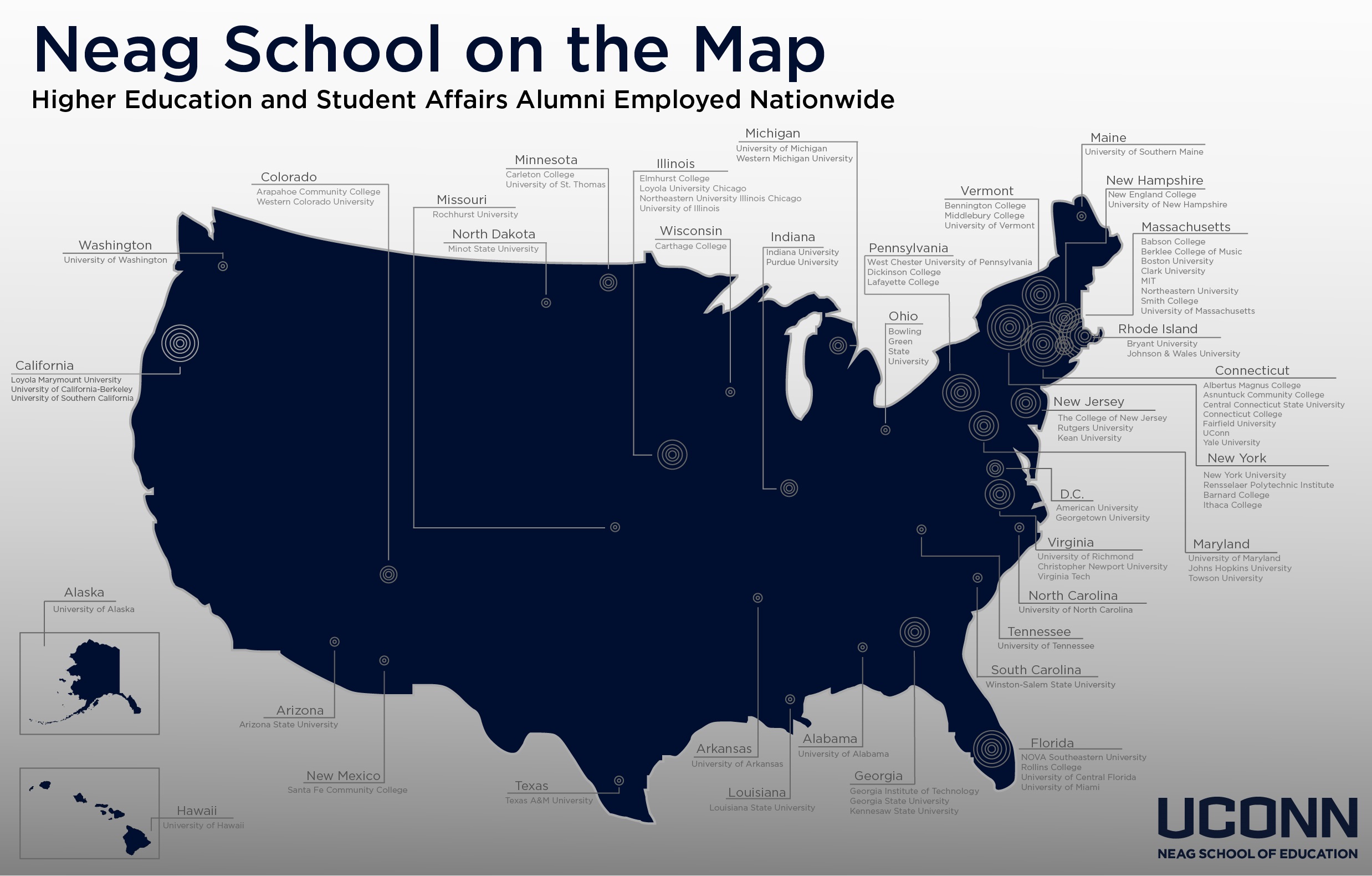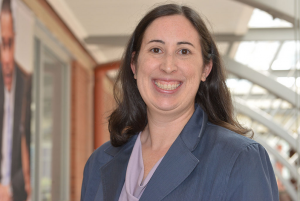The course “Seminar in Higher Education” is an important aspect of the HESA core curriculum. Set in the final semester of the HESA program, the course is designed to further integrate HESA’s curriculum and practice-based experiences to prepare students to make the transition into the next chapter of their journey, whether it be in a professional setting or entering into a doctoral program.
Traditionally, the course has featured a mock interview component which gives students the opportunity to refine their interview skills. This spring offered that same opportunity to students, but featured an exciting update. Intentional changes were made to further reflect what students will experience in a first-round interview while simultaneously providing an opportunity to network with the HESA alumni community. Instead of the traditional in-person mock interviews, students connected with HESA alumni over digital platforms for virtual, web-based interviews.
HESA Program Director Dr. Kari Taylor, who is teaching the seminar this spring, worked with Caitlin Trinh, Director of Alumni Relations at the Neag School of Education, as well as Ana Clara Blesso, Assistant Director for Experiential Learning at the Center for Career Development, and Lisa Famularo, a HESA student whose Graduate Assistantship is with the Center for Career Development. Caitlin reached out to program alumni and helped connect them with the initiative, while Ana and Lisa helped to prepare students for this experience by giving a presentation to the class on how to best prepare for an interview prior to the mock interviews with alumni.
Each student submitted a resume and cover letter for a position to which they were interested in applying. These resources were shared with the alumni who served as the mock employer. Instead of one day for all the interviews, each student-alumni pair negotiated the scheduling of their own interview. With these changes to the overall experience, the HESA community was able to use its strong reciprocal relationships to help students refine their career skills and build valuable professional and mentorial relationships.
To get a better understanding of the new mock interview experience, we caught up with one student-alumnus pair: Current second-year HESA student Cristina Carpentier and HESA alumnus La’Rez Wilson (‘13), who currently serves as the Community Relations Coordinator in the Department of Social Change at The Ohio State University.
The Student Perspective
Cristina CarpentierWhat do you feel that the mock interview program offered you at this point in your HESA experience?
CC: I thought the mock interview assignment was really helpful. Considering that the job search is taking up most of my brain space these days, it was nice to have a class assignment with direct application to that process. While I didn’t end up actually interviewing for the position I chose for my mock interview, the experience still offered me the direction and motivation I needed to improve my interview skills. La’Rez offered me specific feedback on things I did well and the answers that needed further thought; it was a solid combination of a confidence boost and an opportunity for growth. It was also nice to connect with a HESA alum so close to graduation because it reminded me of how far this community extends.
How did you prepare for the interview?
CC: I wanted to be able to answer questions with concrete examples tied to my skills and values. So to prepare for the interview, I scanned the job application for specific skills the employer was looking for and came up with a list of my related experiences. I also read through the office’s and institution’s websites so I could clearly explain how I saw myself fitting into those spaces. Lastly, I came up with a few questions that would help me get the pointed feedback I was looking for from my mock interviewer.
What’s one thing that surprised you about the interview?
CC: I was surprised by how quickly La’Rez and I connected! I suppose it could’ve been because I knew he wasn’t actually looking to hire me – that certainly took some pressure off – but I think it was more than that. I liked knowing that he had been through the same graduate program I’m currently going through. It made me feel more comfortable than I was expecting to feel, which helped me to put my best foot forward. I also appreciated having the opportunity to talk to him a bit about his position and function area. He offered me some helpful and comforting insights on the job search within the service learning and civic engagement function area that I was not planning to walk away with.
What’s one particularly great piece of information you took away from the mock interview process?
CC: I walked away from the mock interview process understanding the importance and value of presenting your most authentic self in interviews. I struggled to answer questions when I began thinking about what the interviewer wanted to hear and he noticed this struggle. On the flip side, the responses that came from my personal values and experiences were clearer and more meaningful. La’Rez advised me to take a moment to myself to consider what I really want to say before responding to challenging questions. I now know that doing so will help me to offer more genuine and effective responses.
What advice would you give to next year’s mock interviewees?
CC: I would advise next year’s mock interviewees to take full advantage of the opportunity by really applying themselves to the assignment and working to build a connection with their interviewers. The job search is a pretty daunting process – take all the help you can get!
The Alumnus Perspective
La’Rez WilsonCan you take us through your journey since you graduated from the UConn HESA program?
LW: Currently I’m at The Ohio State University and I’m working as a Coordinator within their Department of Social Change. I found myself there basically because of my love of working with students, specifically in the realms of civic engagement and service learning. Before coming back to Ohio, which is where I’m originally from, I was doing similar work at Washington University in St. Louis for 4 years. I remember applying for jobs during my second year in the UConn HESA program and I was a little nervous because I was one of the folks in our cohort that didn’t like interviews. When I found the position at Washington University I thought: I love working with students and I love working with kids, so it’s a good combination. While at UConn, I was working in the Office of Community Outreach and I was a Graduate Assistant for the Community Service Learning Community, and those positions made me really want to look into how I could do that professionally and full-time.
What made you want to be a mock interviewer?
LW: Well, I thought back to my own mock interview experience. At the time, I felt like I just tanked! Some of the biggest feedback I got was that I didn’t leverage my skills and experiences enough to really showcase all the work I had done. So when I got the email about being an interviewer for the mock interview program, I thought: this is my time to professionally give back. I know what it’s like to go through the interview experience, I know what it takes to prepare for an interview. At Washington University, I did a phone interview, I did a Skype interview, and of course I had an on-campus interview, and then as part of the job selection process I was required to write an essay. And all this while trying to figure out my plans for the future, still applying for other jobs, and in the midst of my final semester at HESA; it was pretty stressful. So when I got the email from HESA I thought, I need to share these experiences with others and really offer that space for reflection.
What insight were you excited to share with Cristina?
LW: I wanted to share what I was feeling during my own interview experiences, and to dig deeper and understand what she felt during the mock interview. Because those same emotions and behaviors are going to translate themselves into the real-life experience, so let’s take some time to reflect on it now while we still can. I also wanted to share some tips that I’ve picked up along the way from interviewing, from mentors, from my own experience, from my friends. As part of my current position, I work with incarcerated youth in hopes of helping them gain skills in order to reenter society effectively. We’ve been doing workshops in some of the detention centers in the central Ohio area and one of the things we talk about is how to recognize illegal or touchy questions that aren’t necessarily related to the job. For those populations, it’s particularly helpful to understand that because there are such high stakes involved. With Cristina, we didn’t really touch on questions to look out for or anything like that, but we did touch on how to stay vigilant about what’s being asked and why. Knowledge is power, and that’s going to be helpful going into the interview process.
What would you say to HESA alumni who want to get involved in the mock interview program?
LW: Do it! It sounds so to-the-point, but seriously. Mock interviews are a great way to professionally give back, but they’re also a way to make sure that you are still prepped and primed for the career search experience. One piece of advice that I received from a mentor along the way was that if you have the opportunity to be on a search committee, take it. Because it helps you to see what others are seeing when they’re evaluating candidates, but also to improve your eye for recognizing talent. I think that’s something that’s not easily taught. So I think being a mock interviewer is a good opportunity to keep those skills sharp and to share your experience. And ultimately, one of the strongest things that we can do as alumni is help share our stories, help make the process a little smoother, a little less stressful. I told Cristina all that I’m telling you: I was stressed out, I was nervous about interviews, and I think it was validating for her because she felt the same. And it’s good to be able to say hey, I was there, it’s going to get better. And let’s talk about how to get there.
As we wrap up another semester, we’d like to extend our gratitude to everyone who contributed to this year’s successful mock interviews. If you are an alumni who is looking to get involved for future mock interviews, please contact Dr. Kari Taylor.



